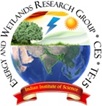Deepthi Hebbale1, 2 M. D. Subash Chandran1 N. V. Joshi 1 T. V. Ramachandra 1,2,*
1Energy and Wetlands Research Group, Centre for Ecological Sciences, Indian Institute of Science, Bangalore 560 012, Karnataka, India 2Centre for Sustainable Technologies, Indian Institute of Science, Bangalore 560 012, Karnataka, India * Corresponding author: emram.ces@courses.iisc.ac.in (T.V. Ramachandra)
|

